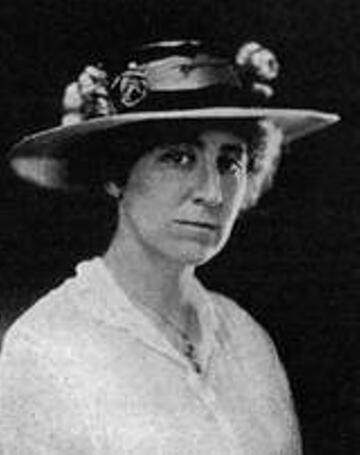From collection Candidates

In 1916 Jeannette Rankin became the first woman ever elected to the United States Congress (House of Representatives). She ran as a Republican from Montana. Rankin was a social worker, suffrage, and peace activist. In 1913 she took over the well-organized Montana Equal Suffrage Association campaign to win a state suffrage amendment. The campaign was successful and gave Rankin the additional constituency of newly enfranchised women when she declared herself a candidate for the U.S. House of Representatives in 1916. She ran in the contest for Montana's two at-large representatives to Congress. She campaigned as a woman candidate who emphasized issues of importance to women's groups including world peace and equal pay, but also cultivated labor, and farmers through her support of an eight-hour day, the end of child labor, and federal water policy favorable to western states. Running second in the field, she benefited from the at-large election that allowed multiple winners. She was said to be the first woman in the world elected to a national legislative body. Immediately after her election to the 65th Congress she became, by some accounts, the best known woman in the world and was spoken of as a possible presidential candidate. In the House of Representatives she worked for woman suffrage, child protection legislation, world peace, and prohibition. She cast one of more than fifty votes against United States entry into World War I. The women's movement was split in its view of her pacifism and her vote.The country's pre-occupation with World War I diminished her ability to lobby domestic reform legislation during her two-year term. Rankin's position on radical labor issues and the gerrymandering of her at-large district diminished her chance of re-election to the House of Representatives. Instead, in July 1918, she announced as a candidate in Montana's Republican Senate primary. When she failed to win the nomination, Rankin ran as the candidate of the National (Independent) Party, again seeking to interest a coalition of labor, agriculture, and women. In this campaign, as in 1916, she failed to win the support of the National American Woman's Suffrage Association (NAWSA) or its leader Carrie Chapman Catt, who believed that Montana's Senator Thomas Walsh could better serve the cause of woman suffrage. She lost her bid to become a national senator, but she and Anne Martin of Nevada made history in 1918 as the first women to campaign for the U.S. Senate. In 1940 Rankin capped decades of anti-war activism by again running successfully for a seat in the U.S. House of Representatives. After taking her seat, she cast the sole vote against bringing the United States into World War II. She later said that her second term "ended for all practical purposes the day the Japanese bombed Pearl Harbor...[and her vote] made her a reviled figure." Rankin was born on a ranch in the then Montana Territory, the oldest of seven children. In 1902 she graduated from the University of Montana with a major in biology. She moved to New York City in 1904, remaining there for some years. During this time she worked with poor families as a visiting nurse and developed her commitment to pacifism, civil rights, and women's rights. Rankin lived briefly in Spokane in 1910 where she studied social policy and became more involved with the woman suffrage movement. When Rankin failed in her 1918 bid to be elected to the U.S. Senate, she went to work as the field secretary of the National Consumers League, while also lobbying for health legislation to protect mothers and children. A decade later she began working for the National Council for the Prevention of War. In 1940 when Rankin was again elected to the House of Representatives, she continued to maintain an anti-war position and to argue that unemployment, poverty, and poor health were the enemies of the American people. Rankin ran as a National (Independent) Party candidate for the U.S. Senate after failing to win the Republican primary nomination. Her vote, while a member of the House of Representatives, against the resolution whether or not the United States should enter World War I was credited as creating dissatisfaction among Republicans who might have given her that party's nomination as a candidate for the Senate.






